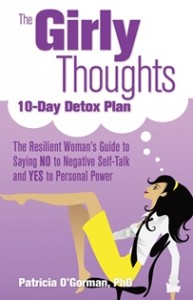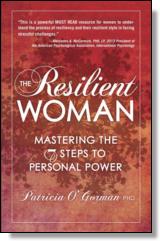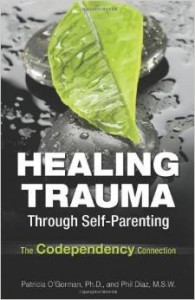By Patricia O’Gorman, PhD
Author of
 The Girly Thoughts 10-Day Detox Plan: The Resilient Woman’s Guide to Saying NO to Negative Self-Talk and YES to Personal Power (publication date 10.28.14)
The Girly Thoughts 10-Day Detox Plan: The Resilient Woman’s Guide to Saying NO to Negative Self-Talk and YES to Personal Power (publication date 10.28.14)

The Resilient Woman: Mastering the 7 Steps to Personal Power (2013)
 Healing Trauma Through Self-Parenting—The Codependency Connection (2012)
Healing Trauma Through Self-Parenting—The Codependency Connection (2012)
Perhaps the name Misty Copeland is not a familiar to you—yet. It will be very soon. Misty is the latest prima ballerina for the American Ballet Theatre, a cause of celebration in and of itself. But that is only part of the story for this young African American woman.
As the youngest of six children raised by a single mother, Misty is a living, breathing example of not letting those girly thoughts trip you up. Girly thoughts tell you what you can and cannot do, how you should and should not look, and the punishment you can expect if you don’t listen to these implied societal directives. Misty chose to ignore those messages, especially the ones that began with You Can’t.
The fact that Misty didn’t look like your typical ballerina didn’t stop her. Truth be told, she had many things against her:
- She is only 5’2” when the average height for a ballerina is 5’7”.
- She isn’t Caucasian, like almost every other prima ballerinas.
- She didn’t begin dancing until she was thirteen. Most ballerinas begin their arduous training before they even begin school.
But none of this stopped Misty from listening to her body, and her body told her to dance beautifully, gracefully, like a ballerina.
Her Key to Success
What did Misty listen to? She listened to herself, not to the limits she felt from society. Misty listened to her dreams, her senses, the love she had of her body moving in space, for leaping, spinning, and landing with grace and ease. This is what she wanted. This is what she achieved.
Misty’s drive and resilience shine through in this riveting video, which is part of the Under Armour campaign “I Will What I Want”:
https://www.youtube.com/watch?v=ZY0cdXr_1MA
What Do You Want?
- If you want to give yourself permission to just feel, what is getting in the way of doing what your body say it wants to do?
- How do you see your body moving? How does this feel? And if it doesn’t feel good—ask yourself why not.
- What is stopping you from giving yourself this gift? Do you think you’d look ridiculous? That you’ll be judged? If so, ask yourself, “By what?”
Say “Get Lost” to Your Girly Thoughts
Tell the part of yourself that has internalized all the do’s and don’ts—the part that is the good girl you were raised to be—to get lost. Tell your girly thoughts you want to dream, and you want to make your dreams come true. Turn on your music and move. You may be surprised how truly easy it is to be you, to trust your body, to feel and follow your senses.
This is the beginning of you trusting you to take care of yourself, of you becoming more resilient.
Patricia A. O'Gorman, Ph.D., is a psychologist in private practice. She is noted for her work on women, trauma, and substance abuse and for her warm, inspiring, and amusing presentations that make complex issues accessible and even fun. She has served as a consultant to organizations across the country in preventative and clinical strategic planning. Dr. O'Gorman is a cofounder of the National Association for Children of Alcoholics, and she has held positions ranging from director of a rape crisis center to clinical director of a child welfare agency, and director of the division of prevention for the National Institute on Alcohol Abuse and Alcoholism (NIAAA). She is a veteran of numerous television appearances, including Good Morning America, Today, and AM Sunday and is the author of eight books including: The Girly Thoughts 10 Day Detox Plan (2014), The Resilient Woman: Mastering the 7 Steps to Personal Power (2013), and Healing Trauma Through Self-Parenting (2012) 12 Steps to Self-Parenting.

